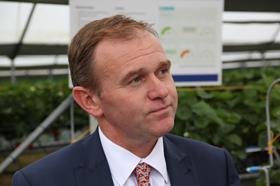
The government has launched the UK Agriculture Partnership (UKAP), a new forum bringing together stakeholders from across the UK to identify and improve collaborative working on shared issues facing the agricultural sector.
Discussions will explore topics such as on-farm water usage optimisation, the role of science and agri-tech in supporting food production, and solutions to reduce pollution and carbon emissions in the sector.
The first meeting of the UKAP took place on 27 January at the Royal Agricultural University, Cirencester, and focused on water quality. Attendees heard from a range of experts who set out the challenges the UK is facing, and discussed solutions for improving water quality across the agriculture sector.
Sustainability focus
Sustainable agriculture has a vital role to play in helping to solve many of the most pressing issues the world faces such as biodiversity decline, meeting net-zero targets and growing the food needed to feed an increasing population, Defra said.
Universities, agricultural colleges, research institutes and agri-tech centres from across the UK are playing a central role in pioneering world-leading new approaches, and UKAP aims to provide a platform for academics, experts, industry players and farming stakeholders to share scientific knowledge and best practice to learn from each other and identify innovative solutions to common problems.
Attendees for the event included researchers, water body representatives, farming organisations, NGOs, as well as the Northern Ireland Executive minister for agriculture, environment and rural affairs, Edwin Poots.
Environment secretary George Eustice said: 'I am launching the UK Agriculture Partnership to share UK-wide best practice, ideas and innovation – and to tackle some of the common challenges we face, from enriching our soils and reducing the environmental impacts of agriculture, to how best use technology and science to boost our food production ambitions.
'We are bringing together farmers, farming unions, environmental groups, agricultural colleges and associations so that we can tackle practical challenges together.'



